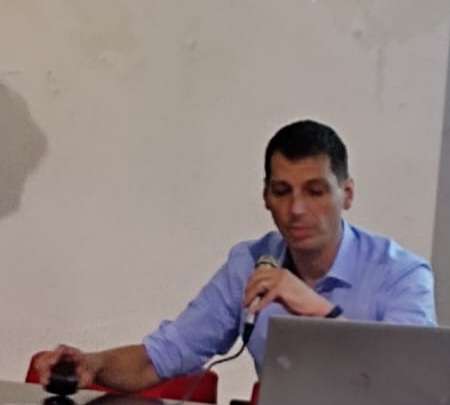Studying at the University of Verona
Here you can find information on the organisational aspects of the Programme, lecture timetables, learning activities and useful contact details for your time at the University, from enrolment to graduation.
Academic calendar
The academic calendar shows the deadlines and scheduled events that are relevant to students, teaching and technical-administrative staff of the University. Public holidays and University closures are also indicated. The academic year normally begins on 1 October each year and ends on 30 September of the following year.
Course calendar
The Academic Calendar sets out the degree programme lecture and exam timetables, as well as the relevant university closure dates..
| Period | From | To |
|---|---|---|
| I semestre Ferrara | Sep 23, 2019 | Dec 20, 2019 |
| II semestre Ferrara | Feb 24, 2020 | May 29, 2020 |
Exam calendar
Exam dates and rounds are managed by the relevant Culture and Civilisation Teaching and Student Services Unit.
To view all the exam sessions available, please use the Exam dashboard on ESSE3.
If you forgot your login details or have problems logging in, please contact the relevant IT HelpDesk, or check the login details recovery web page.
Should you have any doubts or questions, please check the Enrollment FAQs
Academic staff
 riccardo.bertolazzi@univr.it
riccardo.bertolazzi@univr.it

Mastrocinque Attilio
 attilio.mastrocinque@univr.it
attilio.mastrocinque@univr.it
 +39 045802 8386
+39 045802 8386
 emanuele.vaccaro@unitn.it
emanuele.vaccaro@unitn.it
Study Plan
The Study Plan includes all modules, teaching and learning activities that each student will need to undertake during their time at the University.
Please select your Study Plan based on your enrollment year.
1° Year
| Modules | Credits | TAF | SSD |
|---|
3 modules to be chosen among the following2 modules to be chosen among the following2° Year activated in the A.Y. 2020/2021
| Modules | Credits | TAF | SSD |
|---|
2 modules to be chosen among the following3° Year activated in the A.Y. 2021/2022
| Modules | Credits | TAF | SSD |
|---|
4° Year activated in the A.Y. 2022/2023
| Modules | Credits | TAF | SSD |
|---|
| Modules | Credits | TAF | SSD |
|---|
3 modules to be chosen among the following2 modules to be chosen among the following| Modules | Credits | TAF | SSD |
|---|
2 modules to be chosen among the following| Modules | Credits | TAF | SSD |
|---|
| Modules | Credits | TAF | SSD |
|---|
Legend | Type of training activity (TTA)
TAF (Type of Educational Activity) All courses and activities are classified into different types of educational activities, indicated by a letter.
History and Archaeology of the ancient Near East (2020/2021)
Teaching code
4S007427
Teacher
Coordinator
Credits
6
Language
Italian
Scientific Disciplinary Sector (SSD)
L-OR/01 - HISTORY OF ANCIENT NEAR EAST
Period
CuCi IIA, CuCi IIB
Learning outcomes
Il corso magistrale mira a fornire le conoscenze e gli strumenti di base per lo studio approfondito e l’avvio dell’attività di ricerca nell’ambito della storia e archeologia del Vicino Oriente, attraverso l’analisi esemplificativa di una tematica storico-archeologica di ampio respiro che consenta di illustrare l’applicazione di diversi approcci metodologici e avvii all’uso delle fonti e della letteratura secondaria.
Program
The course aims to provide a geographical and chronological framework to the history and the archeology of the ancient Near East, offering a general view the history of the discoveries, on the natural environment, on the sources, an overall periodization and a synthesis of its history from the Neolithic to the first millennium BC.
A special focus will be given to the Lebanese area and on the evolution of the city of Byblos from Prehistory to Phoenician era.
| Author | Title | Publishing house | Year | ISBN | Notes |
|---|---|---|---|---|---|
| Davide Nadali e Andrea Polcaro (a cura di), | Archeologia della Mesopotamia antica | Carocci | 2015 | ||
| P. Matthiae | Prima lezione di archeologia orientale | Laterza | 2005 | 978-8-842-07382-6 |
Examination Methods
Oral exam.
The exam will focus on topics and materials illustrated during the lessons, as well as on the reference texts that will be indicated during the course. Some reference books useful as introduction to the subject, for comparisons or in-depth information are listed below. Students will be requested to illustrate specific topics of the program to demonstrate their knowledge of the proposed subjects and their abilities in analysis, synthesis and methodological evaluation.
Study materials and bibliographical references will be provided during the lessons. A basic bibliography is given here below:
P. Matthiae, Prima lezione di archeologia orientale, Laterza, Bari 2005;
M. Liverani, Antico Oriente Storia società economia, Laterza, Laterza, Roma-Bari, 1988 (2018, 5 ed.);
D. Nadali e A. Polcaro, Archeologia della Mesopotamia antica, Carocci, Roma 2015.
F. Giusfredi, Il Vicino Oriente antico. Breve storia delle origini alla caduta di Babilonia, Carocci, Roma 2020;
M. Kilani, Byblos in the Late Bronze Age, Leida 2020
Type D and Type F activities
Modules not yet included
Career prospects
Module/Programme news
News for students
There you will find information, resources and services useful during your time at the University (Student’s exam record, your study plan on ESSE3, Distance Learning courses, university email account, office forms, administrative procedures, etc.). You can log into MyUnivr with your GIA login details: only in this way will you be able to receive notification of all the notices from your teachers and your secretariat via email and soon also via the Univr app.
Graduation
Linguistic training CLA
Doppio Titolo
Il doppio titolo è un programma integrato di studio attivato a seguito di una convenzione fra l’Ateneo di Ferrara e una Università straniera.Nell'ambito del corso di laurea magistrale in Quaternario, preistoria e archeologia è attivo un progetto di doppio titolo erogato in partnership con il Master “Mention Archéologie, sciences pour l’archéologie parcours Arts, Sociétés, Environnements de la Préhistoire et de la Protohistoire: Europe, Afrique” dell’Université de Toulouse Jean Jaurès (Francia)
Gli interessati potranno candidarsi al progetto come previsto dal bando di selezione.
Per ulteriori informazioni si rimanda al bando di ammissione del doppio titolo:
http://www.unife.it/interfacolta/lm.preistoria/doppio-titolo




